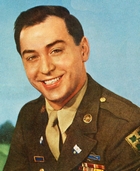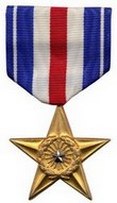Pete Petropoulos
Ballplayers Wounded in Combat
| Date and Place of Birth: | February 20, 1915 Queens, NY |
| Date and Place of Death: | December 1, 1996 Atlanta, GA |
| Baseball Experience: | Minor League |
| Position: | Pitcher |
| Rank: | Staff Sergeant |
| Military Unit: | Company D, 22nd Infantry Regiment, 4th Infantry Division US Army |
| Area Served: | European Theater of Operations |
Peter J. “Pete” Petropoulos was born in Queens, New York, on February
20, 1915. During the 1930s, despite his diminutive size, he was one of
the leading athletes in the Borough, excelling in both baseball and
basketball.
A left-handed pitcher, he was often overlooked by pro scouts because he
was small, but in the spring of 1937, he was invited to report to spring
training with the Class A New York-Penn League's Albany Senators.
Petropoulos, however, turned down the offer because he had secured a job
at a department store. Instead, he played baseball that summer with the
Astoria Diamonds.
In 1938, Petropoulos was pitching for the Maspeth Melvinas semi-pro team
and playing basketball for the Castle Hall Pros, as well as throwing
batting practice for the Brooklyn Dodgers, when another opportunity to
play organized baseball came along the following year. He had a spring
tryout with the Minneapolis Millers in Daytona Beach, Florida, in 1939.
Although he didn't join the team when they headed north, he did stay in
Daytona Beach and pitched for the Daytona Beach Islanders in the Class D
Florida State League. Released by the Islanders in late May, he joined
the Leesburg Anglers in the same league, and moved on to the DeLand Red
Hats, also a Florida State League entry, in August. Petropoulos finished
the season with a 9-10 record and 3.79 ERA, over 35 games for the three
clubs.
In 1940, Petropoulos caught on with the Fort Lauderdale Tarpons of the
Class D Florida East Coast League, and was 7-4 as a pitcher with a 2.88
ERA, but also played first base and the outfield, batting .220. In
October 1940, he was with the Tarpons on a 10-day tour of Cuba, before
returning home to Queens where he played basketball during the winter
months. From 1939 to 1941, he played professional basketball for the
Paretti Association team in the Long Island Professional League. Paretti
were league champions in 1940.
For the 1941 season, Petropoulos was slated to join the Jackson Tars of
the Class B South Atlantic League, but he decided to quit professional
baseball. On March 6, 1941, Petropoulos was drafted and entered military
service with the Army.
Stationed at Fort Benning, Georgia, he pitched for the 1st Battalion
team and, on June 8, 1941, Petropoulos threw a 4-0 no-hitter for the
22nd Infantry Regiment team against the 20th Engineers. In November
1941, he wrote Bob Mann of the Long Island Star-Journal: "With playing
basketball, maneuvers in Louisiana and now in North and South Carolina,
have been all over the South. But I still wish I was back in Queens.
This isn't an easy life."
In 1942, Corporal Petropoulos was assigned to Camp Gordon, Georgia,
where he married Gloria Odom, pitched for Camp Gordon team and also for
Waynesboro in the Georgia State (semi-pro) League. During the winter of
1942-1943, he captained his basketball team to the 4th Infantry Division
title with a record of 28 victories and six defeats for the season.
In April 1943, after two years at Camp Gordon, Petropoulos was
transferred to Fort Dix, New Jersey. In January 1944, Staff Sergeant
Petropoulos left the safety of the United States and arrived in England
as part of the D-Day invasion build-up with the Company D, 22nd Infantry
Regiment, 4th Infantry Division.
On June 6, 1944, the 4th Infantry Division landed at Utah Beach in
Normandy, France. "I thought I saw plenty playing baseball over the
country," he told Lou O'Neill of the Long Island Star-Journal, "but my
eyes saw much more over there. We (he and 23 men of his machine-gun
section) established the beachhead on Normandy on June 6 - D-Day - and
kept on going forward. We had to plough through water for two miles.
"On June 7, at 2PM, our lieutenant took us to a position in between two
open fields. We were in a hedgerow. The Jerries hit us from the front
right side and worked to our rear. My battalion laid a smoke screen and
fell back to a better position. The 24 of us were alone fighting. I told
my men to pull out while I threw a few hand grenades — and hoped for
"strikes" — to give them cover. But in a few moments the Jerries hand-grenaded
me. Only three of my men got away and I was the only one left alive on
the field. The Jerries killed the other 20. I played dead.
"On June 8, the Germans put me in a barn with other American wounded.
After I had lain there for two days and one night they took us to
Monteburg, 12 miles from Cherbourg. All of us lay there with the
American forces hitting the town day and night and the Navy shelling the
town from the Channel. The torture we went through I will never forget.
We had only a glass of milk a day with some crackers. No medical aid.
And both of my feet were hit, shot twice in my left leg, my right femur
broken with a hole in it as big as an indoor baseball. My left hand was
broken. The town was finally taken June 19, 11 days later, by my
regiment. The doctor said only my good physical condition pulled me
through."
Petropoulos was shipped back to the United States with a Silver Star and
Purple Heart. He was sent to Rhoads General Hospital in Utica, New York,
where it was feared he might have to have both legs amputated. Seven
major operations followed and the former ball player’s legs were saved.
Although he would never be able to play professional baseball again, an
injury to his hand could have resulted in him being a more effective
hurler than before the war. A medical report by Doctor John J O’Bell of
Rhoads General Hospital orthopedic section read: “The sergeant cannot
play professional baseball again, due to compound fractures in the upper
thigh bones, which, while healing entirely, may leave a slight
stiffness. However, he can pitch as well as ever, and it is likely he
may pitch better than before, because the second metacarpal of the left
hand, also injured by shrapnel, will have a new formation in healing
that will make possible a better curve. It is reasonable to expect that
he can make a fine coach or instructor in physical education.”
After Petropoulos left hospital he went to work for the New York Giants
as a scout, and in 1948 he became a goodwill ambassador to servicemen
and veterans, conducting The Sporting News Sports Caravan, which, in
conjunction with Liggett & Myers, the makers of Chesterfield cigarettes,
visited veterans’ hospitals in the New York metropolitan area. “I know
from my long years of association with Pete Petropoulos,” David Woodside
told The Sporting News, “that he can talk the language of any vet either
in or out of a hospital.”
This tour was later expanded to take in veterans’ hospitals in southern
states, and Petropoulos also managed the Chesterfield-Sporting News
(later Chesterfield Satisfiers) baseball team that played at veterans’
hospitals for the next 12 years.
By 1950, Petropoulos was also running Greater New York Sports
Promotions, an agency booking events for baseball and basketball teams,
including his own professional basketball team – the Long Island
Bombers. In 1955, The Sporting News gave him his own column – Sounding
Off with Pete Petropoulos – in which Petropoulos gave his views on all
major sports. After leaving Liggett & Myers, he joined Rudd-Melikian,
the food and beverage vending machine company, and was their Director of
Special Services for worldwide sales.
Pete Petropoulos, ballplayer, wounded veteran and recipient of the
Silver Star and Purple Heart, passed away, aged 81, on December 1, 1996
in Atlanta, Georgia.
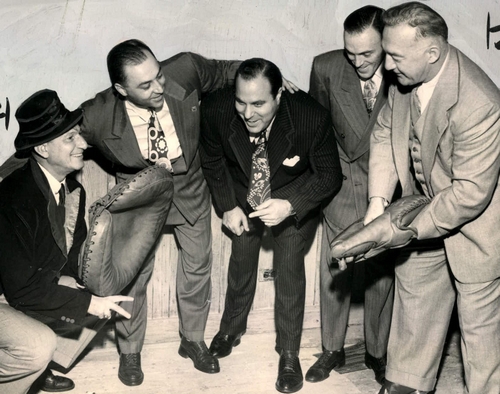
Pete Petropoulos (second left) with Al Schacht (far left) and Frank
Frisch (far right)
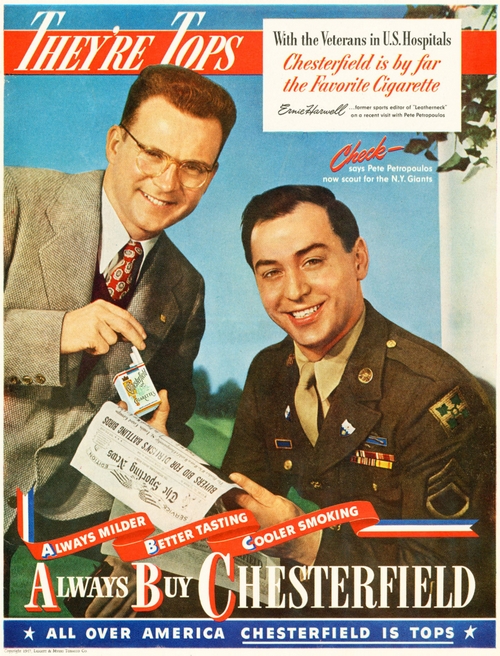
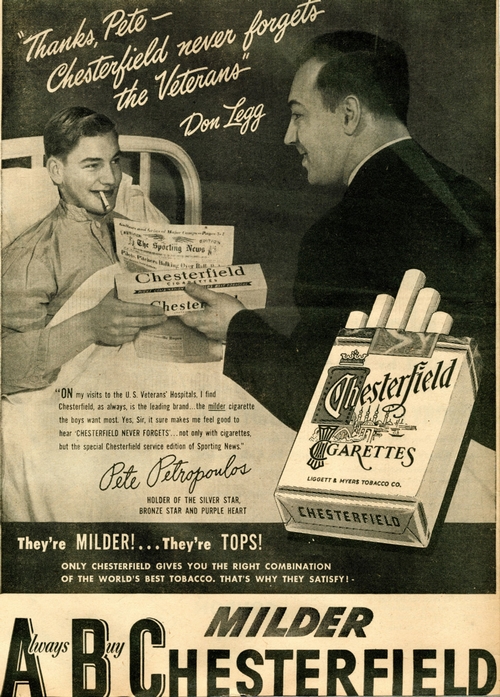
Date Added July 31, 2016
Can you add more information to this biography and help make it the best online resource for this player? Contact us by email
Read Baseball's Greatest Sacrifice Through The Years - an online year-by-year account of military related deaths of ballplayers
Baseball's Greatest Sacrifice is associated with Baseball Almanac
Baseball's Greatest Sacrifice is proud to be sponsored by

